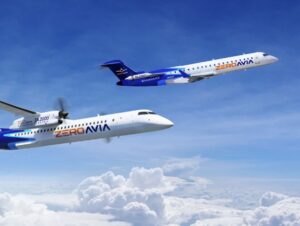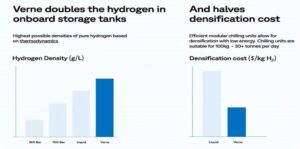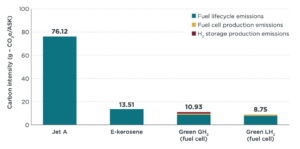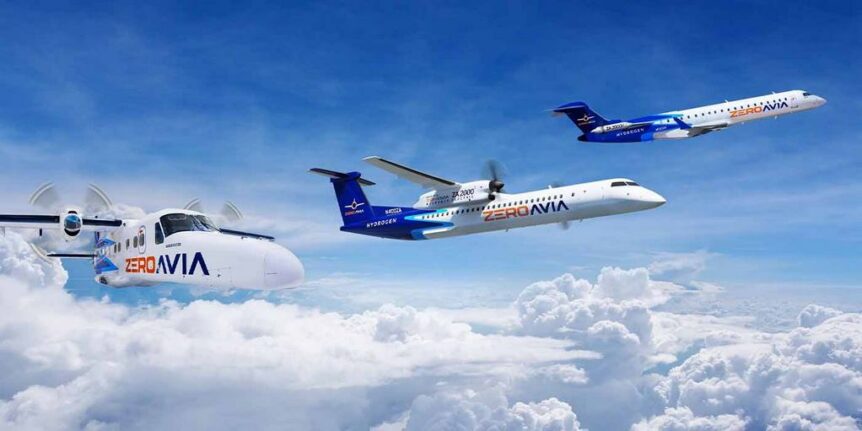ZeroAvia, already deploying hydrogen as a main part of its flight program, is exploring the use of cryo-compressor technology to deliver more energy dense H2 for longer flights.
If we think of gasoline or Diesel fuel as “Cream of Energy Soups,” we might understand their preeminence as energy carriers. A U. S. gallon (3.8 liters) of Gasoline for instance, contains about 33.4 kilowatt-hours of energy. Compare this to a state-of-the-art lithium battery, which tops out at around 0.5 kW-hrs. A Diesel engine might be able to convert 50 percent of that to useful work, with the rest going to waste heat. A gasoline engine fares even worse, extracting perhaps 30 percent as work and 70 percent as waste heat.

Versne’s cryo-compressed H2 will enable larger creft to fly longer distances
Electric Motors, however, are highly energy efficient, some extracting up to 97 percent of a battery’s stored energy. If one uses hydrogen instead of batteries, one can reach parity with the amount of energy available to spin the propellers. As early as 2009, one intrepid flyer made it across the English Channel in a motorized hang glider powered by using only 550 grams per hour of H2. That was for a 55 kilogram (121 pound) aircraft with pilot.
Obviously, larger craft will need bigger tanks and clever ways to condense the gas. The hydrogen, though, usually needs to be compressed or it would take up an enormous volume. Compressing it requires a pressure tank that can handle up to 700 bar (10,150 pounds per square inch) and requires a large amount of energy for that compression.
ZeroAvia and Verne Partner
ZeroAvia is partnering with Verne, a startup “Developing a cryo-compressor technology platform that will convert gaseous hydrogen (GH2) at low pressures (e.g., 20 bar) and ambient temperature (e.g., 300K, or about 80°F) to cryo-compressed hydrogen (CcH2) at 60–80K (-316 to -352°F) and 300 –500 bar (4,351 to 7,252 PSI). CcH2 is thermodynamically optimal for high-density, low-cost storage in achieving an economical hydrogen infrastructure. This platform will provide hydrogen with liquid-like densities using half the energy intensity and at smaller scales relative to liquefaction. If successful, this work will validate cryocompressors as a way to decentralize high-density hydrogen and accelerate deployment and utilization of electrolysis and the broader hydrogen infrastructure of the U.S. and globally.” (That description coming from the ARPA-E (Advanced Research Projects Agency –Electric.)

Greater energy density than even liquid H2 at lower cost – what’s not to like?
Cryo-condensed hydrogen promises a denser form of hydrogen storage that should make faster refueling and lower costs possible for hydrogen aviation
Verne claims, ”cryo-compressed hydrogen can achieve 40 percent greater usable hydrogen density than liquid hydrogen and 200 percent greater usable hydrogen density than 350 bar gaseous hydrogen.”
“Cryo-compressed hydrogen promises to significantly reduce cost of densification and refueling time, increase dormancy time relative to [liquid hydrogen] systems, and potentially eliminate venting for pressure management.”
Sergey Kiselev, Chief Business Officer, ZeroAvia, explains the urgency of such developments. “With our engines just a couple of years from flying passengers and cargo, it is important for us that we find the optimal solutions to support airport hydrogen ecosystems. Increasing storage capacity and refueling speed using novel technologies is an important avenue for scaling up hydrogen aviation, and we’re delighted to work with Verne on assessing the role of cryo-compressed hydrogen.”
Ted McKlveen, Chief Executive Officer & Co-Founder, Verne, adds thoughts on distributing this technology commercially. “Aviation is a massive potential market for Verne, as it becomes clear that hydrogen is critical to tackling the industry’s climate impact. Airports can be centers of hydrogen activity, with co-located hydrogen demand for aircraft, airport ground operations, and on-road commercial transportation. Cryo-compressed hydrogen has a key role in optimizing this ecosystem.”

Verne claims to lower overall emissions even in the creation of cryo-compressed H2
Beside the Department of Energy’s ARPA-E, Verne is financially supported by Amazon’s Climate Pledge Fund, Caterpillar Venture Capital, and Collaborative Fund. Verne is also supported by Breakthrough Energy Fellows.
Late-Breaking News
Verne announced good news from the Uplink World Economic Forum. “Verne has been selected as a Top Innovator in Sustainable Aviation by the Uplink World Economic Forum! Verne’s cryo-compressed hydrogen technology helps hydrogen aircraft extend range and reduce fuel costs. We’re thrilled to work alongside the 15 other Top Innovators and the challenge partners to bring innovative decarbonization solutions to the aviation industry.”
Read more about the Uplink Sustainable Aviation program here.

